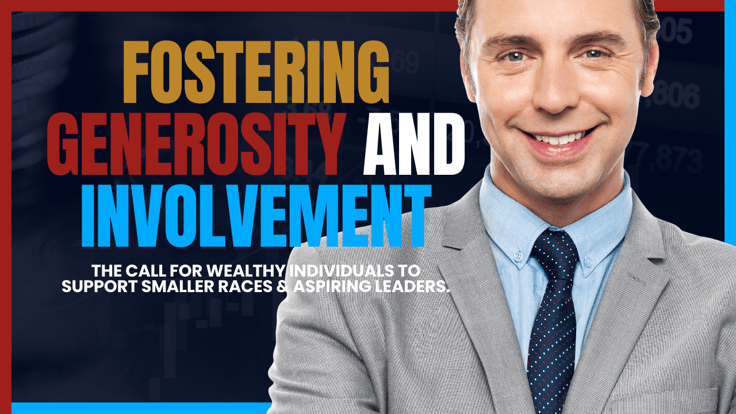Fostering Generosity and Involvement:
The Call for Wealthy Individuals to Support Smaller Races and Aspiring Leaders.
9/23/20232 min read


Introduction
Wealth comes with immense possibilities and responsibilities. There is an increasing call for wealthy individuals to harness their resources and influence to support smaller political races and aspiring leaders who exhibit integrity, vision, and a commitment to societal well-being. This article explores why such involvement is vital and how it can contribute to nurturing a more diverse and balanced political landscape.
The Impact of Supporting Smaller Races
Diversifying Political Landscape: Investing in smaller races can help diversify the political landscape by providing opportunities for candidates with varied backgrounds and perspectives, fostering a more representative and inclusive democracy.
Strengthening Local Communities: Smaller races often have a direct impact on local communities. Supporting candidates in these races can lead to the implementation of policies that address community-specific needs and challenges, ultimately enhancing local well-being.
Encouraging Political Participation: Financial support can lower barriers to entry for prospective candidates, encouraging more individuals to participate in the political process and bring fresh ideas and solutions to the table.
Empowering Aspiring Leaders
Mentorship and Guidance: Beyond financial support, wealthy individuals can offer their experience, knowledge, and networks to mentor aspiring leaders, helping them navigate the complexities of the political arena and refine their leadership skills.
Platform for Voices: The influence and reach of affluent individuals can help amplify the voices of emerging leaders, providing them with a platform to share their vision, connect with a wider audience, and gain recognition.
Capacity Building: Investing in training, education, and capacity-building programs can equip aspiring leaders with the necessary skills and knowledge to effectively advocate for positive change and address societal challenges.
Cultivating a Culture of Philanthropy
Leading by Example: By being charitable and actively involved, wealthy individuals can set an example and inspire others to contribute to the well-being of society, fostering a culture of philanthropy and community engagement.
Strategic Giving: Thoughtful and strategic giving can maximize the impact of charitable contributions, ensuring that resources are effectively utilized to support candidates and causes that align with societal betterment.
Collaborative Efforts: Collaborating with organizations, community groups, and other donors can amplify the impact of charitable initiatives, creating synergies that benefit smaller races and aspiring leaders.
Conclusion
The involvement and generosity of wealthy individuals have the potential to shape a more inclusive and representative political environment. By supporting smaller races and empowering aspiring leaders, they can contribute to the development of policies and initiatives that address diverse needs and challenges, ultimately fostering a more equitable and thriving society. The call for increased charity and involvement underscores the value of collective responsibility and the transformative power of thoughtful giving.
